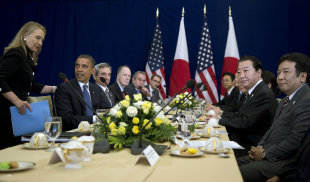PARIS (Reuters) – The broadest-ever retrospective of Salvador Dali, opening in Paris this week, seeks to move beyond the shameless self-promotion that the 20th century Surrealist was often derided for and stress his indelible influence on artists today.
Once dubbed “Avida Dollars” for his love of money, Dali is regarded by some as little more than a marketing product, his Spanish home an obligatory tourist stop, his trademark melting watches the inspiration for money-spinning souvenirs.
But a new show at the Pompidou Centre lays bare the extent of his creative genius, exploring how his experiments with painting, cinema, advertising and installations influenced movements from Pop Art to today’s performance art.
The show, which runs from November 21 to March 25, is set to be a blockbuster of the Parisian art calendar. The last Dali retrospective at the Pompidou in 1979 remains the most visited exhibition in the museum’s history.
“There’s this vision we have of there being a good Dali, the Surrealist, and then the one who came after, who made money,” said exhibition curator Jean-Michel Bouhours.
“We needed to go beyond this distinction between the good and the bad and show how the experimental Dali was extraordinarily important in the history of art and the artistic models that developed in the 60s and 70s.”
The exhibition features some 200 works by the Spanish master, including the famous 1931 “The Persistence of Memory” with melting pocket watches, which Dali said was inspired by watching camembert cheese liquefying in the sun.
Also on show are dozens of works on paper, projects for stage and screen, photographs and films such as the 1929 “Un Chien Andalou“, written with Spanish director Luis Bunuel.
His designs for ballet, decorative arts and even a pavilion for the 1939 New York World Fair earned him the derision of fellow Surrealists such as Andre Breton.
But Dali saw mass media as a more efficient way than painting of getting across his “paranoid critique” of the world.
His 1935 installation, “Mae West’s Face Which May be Used As An Apartment” with its lip-shaped sofa showed an obsession with celebrity that would later influence the Pop Art of Andy Warhol.
Born Salvador Domingo Felipe Jacinto Dali in 1904 in the Catalan town of Figueres, Spain, Dali remains a controversial artist, loved for his creative genius but dismissed by some as a madman and hated for his at times grotesque artistic vision.
Although an anarchist in his youth and deeply attached to his native Catalonia, he was criticized for later declaring himself a monarchist, turning to religion and moving closer to the post-war authoritarian regime of Francisco Franco.
His love of show business and manic declarations such as “Surrealism is me”, alienated many. But he is cited as an influence for many artists such as Damien Hirst and Jeff Koons.
Dali died of heart failure in Figueres in 1989, seven years after the death of his wife and muse Gala.
(Reporting By Vicky Buffery, editing by Paul Casciato)
Celebrity News Headlines – Yahoo! News











